APPLICATION OF ASSOCIATION RULES FOR FORMATION OF PUBLIC (ADMINISTRATIVE) SERVICES PORTFOLIO
Main Article Content
Abstract
The formation of complex services is carried out exclusively according to the principle of association based on a life (business) event or situation. But as practical experience shows, users often request several services at the same time, and these services are not connected by one life event. This can be seen if you analyze the statistical data on service delivery by service delivery centers. The application of intelligent data analysis allows to reveal the hidden relationship between services. Based on this, a new principle of combining services was formulated. The object of research is the process of forming a portfolio of services based on association rules. An algorithm for forming a portfolio and providing recommendations for a decision-maker has been developed. Recommendations are presented in the form of sets of services that can be included in a portfolio. The application of this principle will allow to expand the set of complex services due to new portfolios. This will simplify and improve the service delivery process for both authorities and users.
Article Details
References
(2012), Pro administratyvni posluhy: Zakon Ukrainy vid 06.09.2012 No. 5203-VI. [On Administrative Services: Law of Ukraine on September 6, 2012 № 5203-VI]”, Verkhovna Rada Ukrainy, аvailable at: https://zakon. rada.gov.ua/go/5203-17.
Nazarenko, M.O. and Todorova, O.L. (2022), “Reinzhyniryngh v publichnomu upravlinni u sferi nadannja publichnykh poslugh. [Reengineering in public administration in the area of public services]”,/ Naukovi perspektyvy, No 5(23), pp. 117-126, doi: https://doi.org/10.52058/2708-7530-2022-5(23)-117-126.
(2021), Pro osoblyvosti nadannia publichnykh (elektronnykh publichnykh) posluh: Zakon Ukrainy vid 15.07.2021 No. 1689-IX. [On the specifics of the providing of Public Services (digital Public Services) : Law of Ukraine on July 15, 2021 № 1689-IX], Verkhovna Rada Ukrainy, аvailable at: https://zakon.rada.gov.ua/laws/show/1689-20.
Gavrilenko, O., Zhurakovska, O., Kohan, A., Matviichuk, R., Piskun, A., Khavikova, Y. and Khalus, O. (2022), “The principle for forming a portfolio of public services based on the analysis of statistical information”,/ Eastern-European Journal of Enterprise Technologies, No 3 (3 (117)), pp. 57–64, doi: https://doi.org/10.15587/1729-4061.2022.260136.
Leskovec, J., Rajaraman, A. and Ullman, J. (2020). Mining of Massive Datasets (3rd ed.), Cambridge: Cambridge University Press, 565 p., doi: https://doi.org/10.1017/9781108684163.
Sytnyk, V.F. and Krasnjuk, M.T. (2007), Intelektualjnyj analiz danykh (dejtamajningh): Navch. Posib. [Intelligence data analysis (datamining)], K., KNEU, 376 p.
Aggarwal, C.C., and Yu, P.S. (2001), “Mining Associations with the Collective Strength Approach”, IEEE Transactions on Knowledge and Data Engineering, No 13(6), pp. 863-873, doi: https://doi.org/10.1109/69.971183.
Kumarb, O.S. and Joshi, N. (2016), “Rule Power Factor: A New Interest Measure in Associative Classification”, Procedia Computer Science, No 93, pp. 12–18, doi: https://doi.org/10.1016/j.procs.2016.07.175.
Tjioe, H.C. and Taniar, D. (2005), “Mining Association Rules in Data Warehouses”, International Journal of Data Warehousing & Mining, No 1(3), pp. 28–62, doi: https://doi.org/10.4018/jdwm.2005070103.
Le, Tuong and Vo, Bay (2016), “The lattice-based approaches for mining association rules: a review”, Wiley Interdisciplinary Reviews, Data Mining and Knowledge Discovery, Vol. 6, Iss. 4, pp. 140–151, doi: https://doi.org/10.1002/widm.1181.
E-commerce Business Transaction (Sales transaction of a UK-based e-commerce (online retail) for one year), аvailable at: https://www.kaggle.com/datasets/gabrielramos87/an-online-shop-business.
Gavrylenko, O. and Protsiuk, Y. (2022), “Approaches to the solution to the problem of news-based events forecasting”, Adaptyvni systemy avtomatychnogho upravlinnja, Vol. 1, No 40, pp. 65-70, doi: https://doi.org/10.20535/1560-8956.40.2022.261651.
